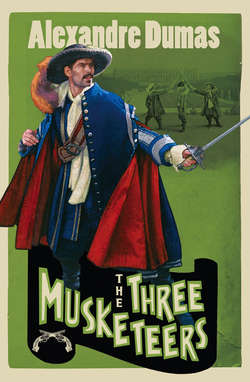Читать книгу The Three Musketeers - Александр Дюма, Alexandre Dumas - Страница 4
Author’s Preface
ОглавлениеIT IS ABOUT a year ago, that in making researches in the Bibliotheque Nationale for my History of Louis the Fourteenth, I by chance met with the Memoirs of Monsieur d’Artagnan, printed by Peter the Red at Amsterdam—as the principal works of that period, when authors could not adhere to the truth without running the risk of the Bastile, generally were. The title attracted my notice; I took the Memoirs home, with the permission of the librarian, and actually devoured them.
It is not my intention here to make analysis of this curious work, but to satisfy myself by referring such of my readers to the work itself as appreciate the pictures of those times. They will there discover portraits traced by the hand of a master; and although these sketches are mostly drawn on the doors of a barrack, or the walls of an inn, they will not find them less true than those likenesses of Louis XIII., of Anne of Austria, of Richelieu, Mazarin, and the majority of the courtiers of that age, drawn by M. Anguetil.
But, as every one knows, that which strikes the eccentric mind of the poet, does not always make an impression on the great mass of readers. So, whilst admiring (as all others doubtless will do) the details which we have described, the thing which strikes us most, is one which certainly had not attracted the attention of any other person. D’Artagnan relates, that on his first visit to M. de Treville, Captain of the Royal Musketeers, he met three young men in the ante-chamber, serving in the illustrious corps into which he solicited the honour of being admitted, and bearing the names of Athos, Porthos, and Aramis.
We confess that these foreign names struck us much, and we suspected that they were feigned appellations, by which d’Artagnan had perhaps concealed the names of illustrious persons; if, perchance, the bearers of them had not themselves chosen them, when, through caprice, discontent, or lack of fortune, they had donned the simple coat of a Musketeer. Therefore we could not rest satisfied till we had found in contemporary literature some trace of the extraordinary titles which had so forcibly excited our curiosity. The mere catalogue of the books we read to gain this end would fill a whole chapter, which would perhaps be very instructive, but certainly far from amusing, to our readers. We will, therefore, content ourselves with saying, that at the very moment when, discouraged by such fruitless investigations, we were about to abandon our researches, we at last, guided by the counsels of our illustrious and learned friend, Paulin Pâris, discovered a manuscript folio, numbered 4772, or 4773, we forget which, having for its title—
THE MEMOIRS OF M. LE COMTE DE LA FÈRE;
RELATING TO SOME OF THE EVENTS WHICH PASSED IN FRANCE ABOUT THE END OF THE REIGN OF LOUIS XIII, AND THE BEGINNING OF THE REIGN OF LOUIS XIV.
Our pleasure may be guessed, when, in turning over this manuscript, our last hope, we found at the twentieth page the name of Athos; at the twenty-first, the name of Aramis; at the twenty-seventh, the name of Porthos.
The discovery of a manuscript entirely unknown, at a period when historical knowledge was raised to such a high pitch, appeared to be almost a miracle. We therefore quickly requested permission to print it, that we might one day introduce ourselves to the Academy of Inscriptions and Belles Lettres with the goods of others, if we do not happen (as is very probable) to enter the French Academy on our own merits.
This permission was most graciously accorded; which we here declare, to give a public contradiction to those malevolent persons who pretend that government is not inclined to indulge authors.
We offer today the first part of this valuable manuscript to our readers, restoring to it the title which suits it, and promising, if (as we doubt not) this should meet with the success it merits, to publish immediately the second.
In the meantime, as the godfather is a second father, we invite our readers to look to us, and not to the Comte de la Fère, for his amusement or his ennui.
